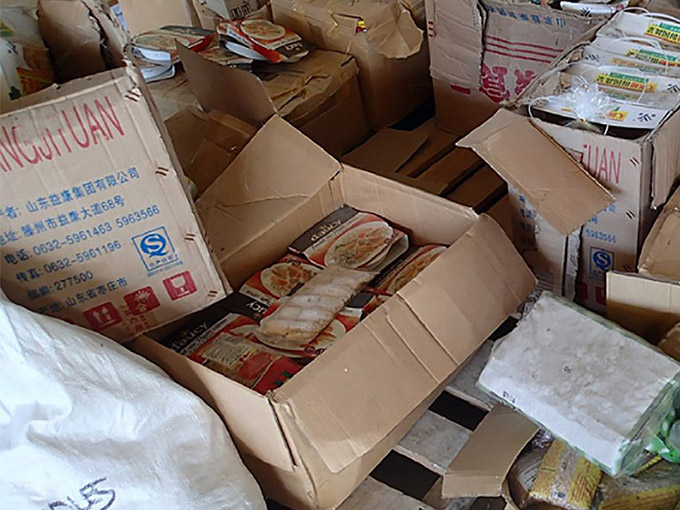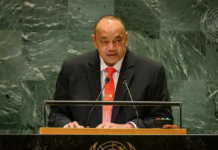
Pacific Media Centre Newsdesk
Tropical Cyclone Pam brought wide-spread devastation to Vanuatu nearly two years ago.
It also brought an outpouring of aid – including 70 shipping containers of unrequested goods from well-intentioned donors who hoped their collections of food, used clothes and household items would reach people in need.
“Massive amounts of cargo started arriving after the cyclone hit and even though my teams were working around the clock, we were inundated,” recalls Benjamin Malas, Vanuatau’s Customs Director.
He was speaking recently in Geneva at a conference of humanitarian aid and government representatives on managing and reducing unsolicited donations during disasters.
“Huge containers were arriving fully loaded with random, poorly packaged and unlabeled items that no one claimed, but still had to be inspected, cleared and stored,” Malas said.
“Some of these donations were put to good use, but much of it never left the wharf.”
An influx of unsolicited donations or gifts-in-kind from well-meaning individuals, community and diaspora groups is a common occurrence in the aftermath of big disasters. In Vanuatu, the items often arrived unannounced, unrequested, without proper paperwork and lacking a defined consignee.
‘Inappropriate for response’
“All too often, these unsolicited donations are inappropriate for the response and don’t meet the needs of the affected populations,” explained Anna Young, who researched and authored a recent report on unsolicited bilateral donations, commissioned by the Australian Red Cross.
“Without a clear plan for getting the goods out to people or funding to process and distribute them, they end up clogging supply chains, disrupting local markets, incurring local costs for handling and storage and diverting valuable time and resources from the response and recovery operations,” Young told the gathering.
In Vanuatu, 20 containers, each containing up to 22 tonnes of donated goods, went uncollected. A year later, they had accumulated more than $2 million in storage fees.
More than half of the donated food, including flour, noodles, juice and tinned fish, had expired and had to be dumped.
Communicating ‘cash is best’
Whenever a disaster hits, first responders like the Red Cross and Red Crescent get swamped with queries from generous people who want to donate supplies, and have limited success in convincing callers that cash is best.
According to the Australian Red Cross report, most relief agencies attempt to do the same, using a similar rationale.
It costs far more to ship and process goods than it would to buy them locally.
Buying locally supports local economies, reduces logistical problems and costs and gets supplies to affected communities quickly.
Cash is fast and flexible and allows responders to provide vital support, based on what affected communities need and want.
“Still, it’s a difficult conversation to have with people who want to help, and it’s a conversation that should start before emergencies happen,” said Young.
Among the key findings of the Australian Red Cross report, Young noted, is that preparedness messaging about effective and responsible giving has been successful in reducing unsolicited donations.
“We found that cash is best messages are received far more favorably in advance of disasters as opposed to after they strike when emotions run high,” Young added.
Regulating relief
It is also critical that governments have clearly articulated laws, policies and procedures in place to facilitate and regulate incoming international assistance, including unsolicited bilateral donations, Lucia Cipullo told the gathering.
She is the senior legislative advocacy officer for the IFRC’s Disaster Law programme, which helps governments strengthen legal frameworks for international disaster relief.
“When countries do not have the right laws and policies, it hampers the response, making aid slower, more expensive, less effective and sometimes counter-productive,” Cipullo said.
Vanuatu did not have the necessary procedures in place to handle the influx of incoming aid and unwanted goods before Cyclone Pam, but the storm and its aftermath served as a catalyst.
The Vanuatu Red Cross and IFRC’s Disaster Law programme have been working with the government of Vanuatu to strengthen their national disaster management laws and procedures, including systems to reduce unsolicited donations in future disasters.
Benjamin Malas said it was the local communities in Vanuatu who were at the heart of every response when disasters happened, but he believes that improved communication, coordination, systems and procedures would make a big difference the next time around, particularly when it comes controlling unsolicited donations.
Way forward
Recommendations offered in the Australian Red Cross report were largely echoed by participants at the conference. They include:
- Enhanced investment and coordination by the humanitarian community and government partners in educating the public, business sector and media on how to effectively and responsibly help in disasters, before, during and after they happen.
- Broader dissemination and adaptation of well-developed messaging, media toolkits, public engagement strategies and other resources on unsolicited donations, produced by agencies like the US Center for Disaster Information (CIDI).
- Development of a centralized information hub and platform for would be donors to harness people’s generosity, provide practical information on best donation practices and specific information on needs, requested assistance and country-specific policies and regulations on aid during emergencies.
- Increased support to governements to strengthen disaster laws, policies and standard operating procedures for international relief operations.
- Greater transparency on how monetary contributions are used to build trust.















































